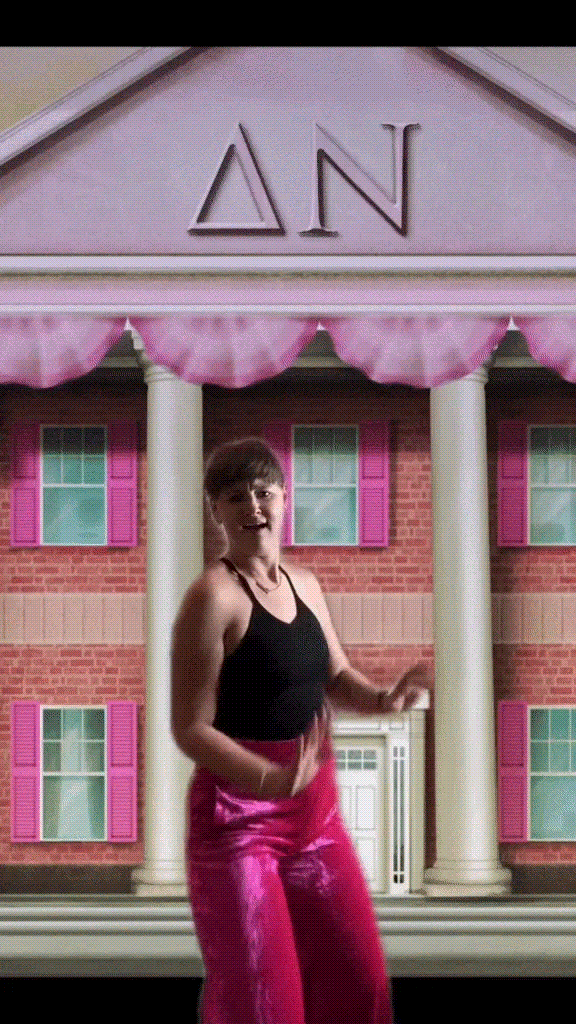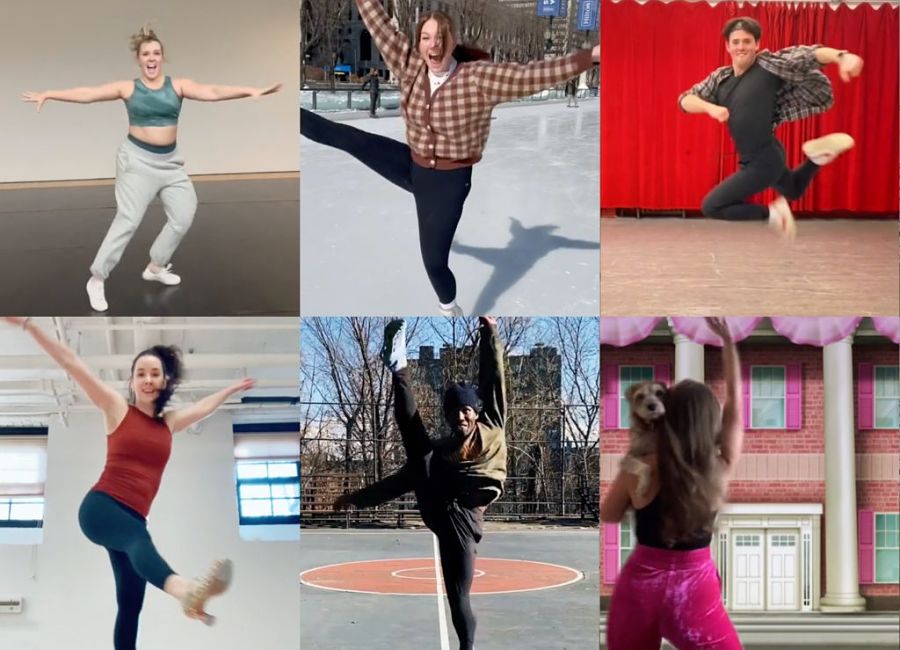







One late January afternoon, I received a text from a fellow musical theatre nerd: “Please send me a link to the Muny dance call thing on TikTok. I need to know what everyone is talking about.”
I quickly spiraled into a scatterbrained overview of the latest hot topic in the musical theatre world: dancers posting self-tapes on TikTok of them performing the audition choreography for the Muny’s upcoming summer production of Legally Blonde, the hit 2007 musical by Nell Benjamin, Laurence O’Keefe, and Heather Hach. What began as a legitimate audition call for the St. Louis theatre had become a micro-trend on TikTok, the short-form video app that has become a culture-wide phenomenon. The Muny Legally Blonde dance call had gone viral.
Set to “Legally Blonde (Remix),” the dance call caught the attention of TikTokers large and small, who were captivated by William Carlos Angulo’s exciting, fast-paced choreography. One such TikToker was Book of Mormon’s JJ Neimann (he/him), who has more than 886,000 followers on the platform and is known for hilarious videos filled with musical theatre humor. Neimann was already planning to audition for the show, having worked there before and being a fan of Legally Blonde. “When I saw one person’s post of the choreo, I was inspired to get off my couch that night and learn it in my living room!” noted Neimann. “I filmed the next day with a few friends in a studio in NYC.”
According to Mike Isaacson (he/him), the Muny’s artistic director and executive producer, the dance call’s TikTok virality “caught us all by complete surprise.” The Muny was simply honoring the Actors’ Equity Association requirement to hold virtual rather than in-person auditions. The result? More than 1,400 people officially auditioned by the Feb. 1, 2022, deadline, uploading a self-tape to YouTube or Google Drive and providing that link to the theatre.
Then came TikTok. Over the Feb. 4-6 weekend, Isaacson became keenly aware that the Legally Blonde casting process had gone well beyond St. Louis. He received emails and texts from colleagues saying, “Are you seeing this?” and “Wow, this is blowing up!” This included a message from Orfeh, who originated the role of Paulette in the original Broadway cast and who told Isaacson how much she was “LOVING THIS.” Admittedly, Isaacson didn’t know what “THIS” was at that point. He’s not on TikTok, so his husband had to download the app to see what all the fuss was about. Said Isaacson, “It was amazing, a bit dizzying, and completely its own thing. People around the world were in on it.”
It recalled the time in summer 2021 when an In the Heights challenge made use of Usnavi and Vanessa’s argument during the film version of “Fireworks”; there are now over 1 million unique videos using the soundbite. Or consider the widespread popularity of Encanto’s “We Don’t Talk about Bruno,” which has been able to ride TikTok popularity to the No. 1 spot on the coveted Billboard Hot 100.
Like 2021’s musical theatre TikTok micro-trend “Rich Man’s Frug” from Sweet Charity, the Legally Blonde dance call is far from this level of viral fame. TikTok’s upper echelon of dance challenges—“Renegade,” “WAP,” “Savage,” “Corvette Corvette”—are beasts of their own. Yet the Legally Blonde dance call is part of a larger trend of posting self-tapes and dance calls on TikTok. This has become standard practice for aspiring dancers hoping to book shows such as Hamilton and Moulin Rouge.
The practice is multi-pronged: Dancers are auditioning (“God, I hope I get it!”) while also building TikTok followings. And, even if the latter practice doesn’t necessarily make them more likely to get a specific role, the potential for a viral video is too enticing to dismiss. In some cases, TikTok virality can lead to blooming follower counts, paid promotions, collaborations, and casting opportunities based on TikTok celebrité.
Of course, posting dance call self-tapes on TikTok raises some ethical concerns, particularly as it relates to dance copyright, which mirrors larger conversations about TikTok and dance credit. The issue of credit and payment is definitely something that choreographer William Carlos Angulo had on his mind.
“The Stage Directors and Choreographers Society is my union, and they are responsible for protecting the work I do on plays and musicals,” Angulo said. “However, because their jurisdiction covers productions only, I am left to sift through the legal implications of ‘going viral on TikTok’ completely by myself. Because I have spent my entire choreography career being protected by my union, it never occurred to me to copyright my work until now.” Angulo has only just begun the long process of copyrighting the dance call audition.
Despite these muddy waters, Angulo recognizes the “powerful culture-making” that takes place on the platform. “Learning dances in my living room by playing and rewinding tapes of old MGM musicals and awards show performances brought me a lot of joy as a child,” recalled Angulo. “Seeing that reflected back to me through the thousands of videos of young people doing my choreography in their living rooms has brought me a new kind of joy that I cannot describe.”
Yet, as usual on TikTok and beyond, there has been some confusion over what exactly this phenomenon is. Is this a TikTok trend or an actual audition? Several TikTokers posted videos saying that they weren’t sure if they were just participating in a TikTok trend or actually auditioning for the Muny.
Absurd as this may sound to a casual onlooker, this absurdity aligns with TikTok’s messy culture. That many of Legally Blonde dance call videos are self-deprecating adds to the Gen Z aesthetic, which continues to set the tone on the app. Many of these dancers know they aren’t going to book it; they know they’re unlikely to see their name in lights. So what do they do? They ham it up, finding the humor in the fast-paced dance.
But the question remains: Are people actually auditioning for Legally Blonde via TikTok? Nope. The Muny never asked anyone to post or share their audition submissions, nor does the Muny use TikTok as a source for auditioning. “The TikTok event is not changing our normal casting process, which takes input from the director, the choreographer, the music director, myself, and my associate artistic director,” noted Isaacson, adding, “It’s a long, rigorous process for each season, because we do seven major productions basically back to back.”
So what’s the value and meaning of this Legally Blonde dance call craze? Mainstream TikTok is all about dance challenges, by which content creators learn complicated dances and thereby boost videos’ view counts. By engaging with the video, TikTokers teach the algorithm to push this kind of content to other similarly minded TikTokers, even as each of us is teaching the algorithm about the type of content we individually want to see. This explains why my TikTok FYP (“For You Page,” the app’s default landing space) became an endless stream of Legally Blonde dance call videos after I first began to engage with the trend.
And though the TikTok videos aren’t official auditions, the Muny has been commenting on them via its official account (@munymagic, 13,900 followers), which not only creates good vibes but also engages with fans, builds a following, and demonstrates the way that TikTok is influencing theatre marketing. Indeed, when done in an organic way, theatres and productions alike might harness TikTok in much the same way they have leveraged social media like Twitter, Facebook, and Instagram.
By this point, most folks in the theatre industry don’t need convincing as to the cultural power of TikTok. The platform has helped productions become commercial successes (Beetlejuice: The Musical,) made musical soundbites part of popular culture (Heathers: The Musical, Six, In the Heights), and even been a place to develop new musicals (Ratatouille: The TikTok Musical, Bridgerton: The Musical).
For his part, avid TikTokers like JJ Neimann–who did submit an official audition tape as well as showing off his moves on the app—-has no intention of quitting the popular app. “Having a sizable following on TikTok has been wonderful and fruitful,” said Neimann, who didn’t set out to become “TikTok famous” but nevertheless went viral making funny videos. As a result, Neimann has signed with a manager, secured brand deals, and become one of Broadway’s most recognizable TikTokers.
Might TikTok marketing also have an impact on ticket sales? It’s still too early to tell. Single tickets for Legally Blonde don’t go on sale until May 23, and the show doesn’t open until July 25, and Isaacson has no idea if this TikTok phenomenon will translate at the box office. Either way, the unexpected sensation has been a success for the Muny’s digital profile. “We do know this exposed so many to just the fact that we exist,” admitted Isaacson. #Muny on TikTok had a modest several hundred thousand views before the dance call; now it’s at 17.8 million views.
“Do I hope that 17.8 million people come to the Muny next summer? Sure, why not?” Isaacson quipped. If we’ve learned anything from this episode, it’s that you may not always get “What You Want,” but if you keep it “Positive” and you don’t have a “Chip on Your Shoulder,” the result can be “So Much Better.”
Trevor Boffone is a Houston-based educator whose work using TikTok with his students has been featured on Good Morning America, ABC News, Inside Edition, and Access Hollywood, among numerous national media platforms. He is the author of Renegades: Digital Dance Cultures from Dubsmash to TikTok and the co-author of Latinx Teens: US Popular Culture on the Page, Stage, and Screen.


